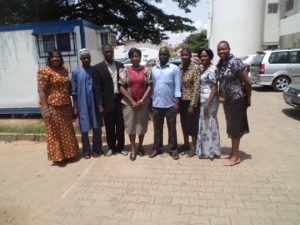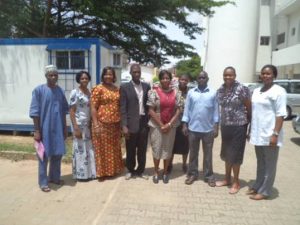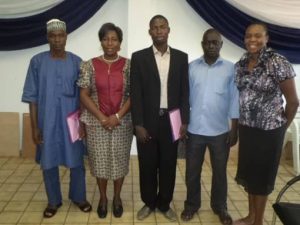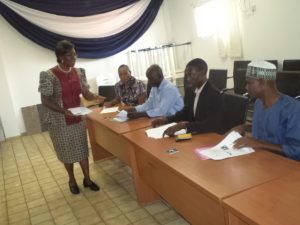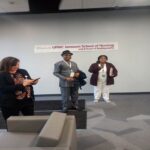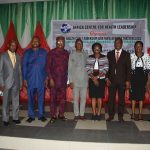ACHL Collaboration With Health Alive Foundation to Implement Global Fund-Supported Community/Ambulatory Multi Drug Resistance – TB Treatment Program in the Fct
26
Aug
ACHL Collaboration With Health Alive Foundation to Implement Global Fund-Supported Community/Ambulatory Multi Drug Resistance – TB Treatment Program in the Fct
Category : ACHL Activities / by ACHL Admin
Africa Centre for Health Care Leadership (ACHL) is collaborating with Health Alive Foundation (HAF) to implement the Community/Ambulatory Multi-Drug Resistance –TB treatment program in the Federal Capital Authority in Nigeria. ACHL overseas the program in the FCT, its proposal having been approved by HAF and the FCT Tuberculosis and Leprosy Control Program.
MDR TB is TB that is resistant to any of the first line drugs especially Rifampicin and Isoniazid. The emergence of MDR TB as a growing scourge threatens to wipe out the gains of previous efforts in controlling TB.
Drug-Resistant TB occurs when drug-susceptible TB patient does not receive the correct treatment regimens or do not complete the full course of treatment among other reasons. With the rising incidence of MDR TB, the WHO introduced the Directly Observed Treatment Short course (DOTS) strategy to ensure that all diagnosed TB patients are compliant with the anti TB drug regimen.
Drug-Resistant TB treatment is divided into two phases: the Intensive phase which is hospital-based, lasting for eight (8) months and the Continuation phase which is community-based lasting for twelve (12) months. In some cases, the patient is discharged earlier than eight months to complete the Intensive phase within the community and subsequently be enrolled in the Continuation phase within the community.
HAF is the sub-Recipient of the Global Fund Round 9 Phase 2 MDR-TBG grant to strengthen multi-drug resistant Tuberculosis prevention and control in Nigeria for and on behalf of the Institute of Human Virology Nigeria (IHVN). On the 7th day of April 2014, a Memorandum of Understanding (MOU) was signed between Health Alive Foundation (HAF) the Sub-Recipient of the grant and Africa Centre for Health Leadership (ACHL)to implement the following objectives:
- To promote behavioural change about tuberculosis in the community
- To pursue High-Quality DOTS expansion and enhancement
- To scale-up TB/HIV collaborative activities and strengthen TB/HIV integration
- To strengthen MDR-TB prevention and control
- To strengthen the technical and management capacity of the National Tuberculosis and Leprosy Control Programme.
The Community/Ambulatory Multi-Drug Resistance –TB treatment program is an integration of social mobilization on TB services that link with existing HIV/AIDS clusters to improve knowledge of and access to TB/HIV care and treatment at the community level. The program goes beyond working with patients and their treatment supporters to conducting advocacy and sensitization to community gatekeepers such as Government Officials, Traditional, Religious and Opinion leaders, private bodies and philanthropists, towards raising awareness among community members on MDR-TB.
In April 2014, ACHL TB/HIV Program Manager participated in the Community-based Organization training on Community Ambulatory MDR TB program implementation at Green Apples Guest House, Sabo Tasha, Kaduna State. After the training, ACHL was assigned the responsibility to support the TB patients and the implement related community prevention programs in line with the TOR. By the end of May 2014, three of the seven patients in the care plan completed their treatment successfully and exited the program; and two more were enrolled in June and one in July 2014.
Activity Progress Report
ACHL after signing the MOU with HAF has implemented the following activities in FCT:
Activity 1:1
Planning meetings with the FCT State TB Control Officer:
As kick-off on the program, the TB/HIV focal person for ACHL Dr. Victoria Eyo Joshua visited the FCT State TB Control Officer to introduce the program, explain the organizations’ responsibilities relating to the program,and the plans for stakeholders participation and engagement especially with regards to the involvement of the TB Control Office in the project. Roles were clarified and program plan firmed up.
Activity 1:2
Visit to the Local Government Supervisors and identification of patients within the local government:
ACHL visited the Local Government Supervisors in FCT to identify patients in each LGA.
Activity 1:3
Identification and Recruitment of Treatment Supporters (TS) and CVs for the patients:
ACHL in conjunction with the Local Government TB supporters (LGTBS)/DOT providers (General Health Workers, GHW) identified and recruited treatment supporters for each patient in the continuation phase of treatment in the community. Contact details of the TS and CVs were collected, rapport established, working modalities and monitoring plans developed.
ACHL Criteria for Selection of Treatment Supporters for identified TB Patients
Treatment support for the patients is voluntary. The treatment supporter for each patient lives near the patient and is selected from existing community health workers, chosen and acceptable to the patient and his or her family. They are available to support the patient at any time during the day or night and can observe confidentiality of the patient’s records. It is not recommended to appoint a member of the patient’s family as their DR TB Supporter. The family relationship may interfere with his or her ability to monitor treatment. From experience, family members of the patients are not appropriate to supervise doses. Young and preferably female DR TB Supporters are recommended for pediatric.
Activity 1:4
Training of Treatment Supporters and the Local Government Supervisors:
As a follow-up with the selected treatment supporters, ACHL organized training for TS’s to help their daily monitoring, care and support of patients at the community level.
ACHL on the 2nd of June 2014 conducted training for treatment supporters together with Local government supervisors in AMAC, FCT. The training was focused on:
- Basic Information On TB/MDR TB
- Treatment of DR TB
- DOTS
- Complications Of the Drugs
- Infection control
- Contacts and Defaulter Management
- Roles of Treatment Supporters
The selected focus areas were mainly to help TS become TB advocate at the community level, identify the roles ahead of them and the need to maintain constant time for medication of patients. The training was an opportunity for the treatment supporters to learn the importance of good coughing hygiene and allay the fears on their vulnerability as household contact of the patient.

Activity 1.5
Monitoring of TS Visit to DOTs Providers
One of the roles of the TS to the patient is to accompany/support the patients to collect drugs from the health facilities and ensure proper storage.
As a means of monitoring collection of drugs from the DOTs Provider by the treatment supporter, ACHL dropped an exercise book with the DOTs providers where the patients are. The TS signs at each visit to the DOTs provider and the Program Manager from ACHL goes to look at this book monthly.
Activity 1.5
Spot home visits and pill counts
The ACHL program Coordinator on monthly bases makes an unannounced visit to the patient’s home first to ask the patient and his or her family about the DR TB Supporter. During the visit, the DR TB Supporter is called to discuss any issues and reinforce teaching points. A pill count is also done at monthly evaluations or during spot visits. The coordinator counts the remaining pills and compares this number to the number of pills that should be remaining based on the number of days since the medication began. The TS is meant to explain if there are any extra or missing pills.
Other Activities
- Hold monthly meetings with LGTBS/GHWs/TS to discuss patients’ progress
- Activity and quarterly report of project activities to HAF.
- Addressing socioeconomic problems among Dr-TB patient.
- Keep track of and ensure compliance of follow-up appointment dates for all DR-TB patients.
- Attend project coordination meeting – sharing information, experience, and reports
- Ensure contact screening for all symptomatic contacts of DR-TB patients
- Conduct quarterly review meeting as shall be directed by HAF
- Ensure accountability of DR TB patients assigned to ACHL.
- Attending state quarterly review meetings.



